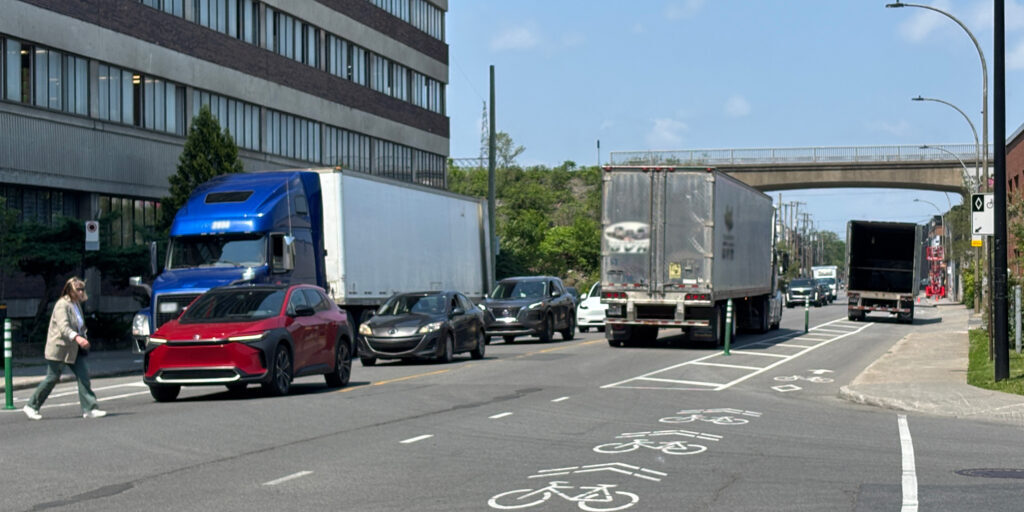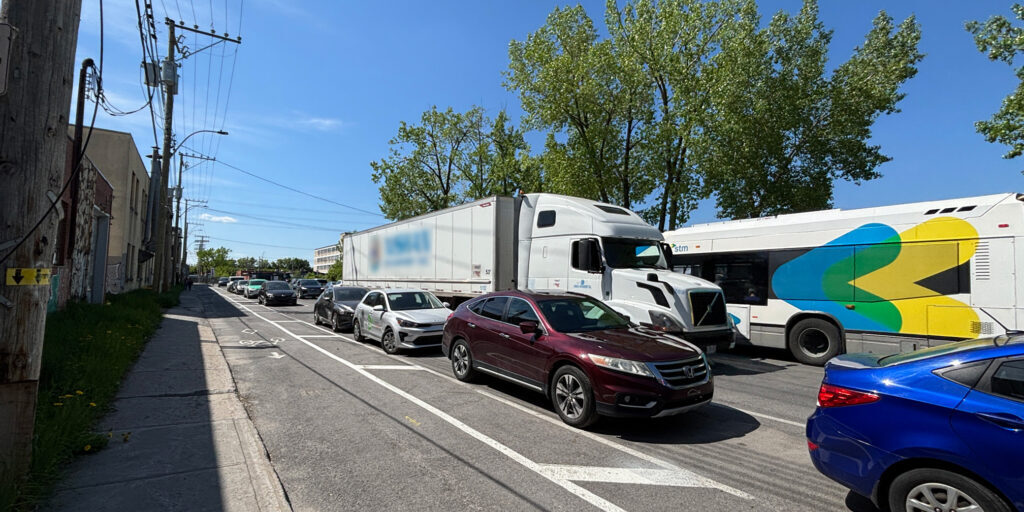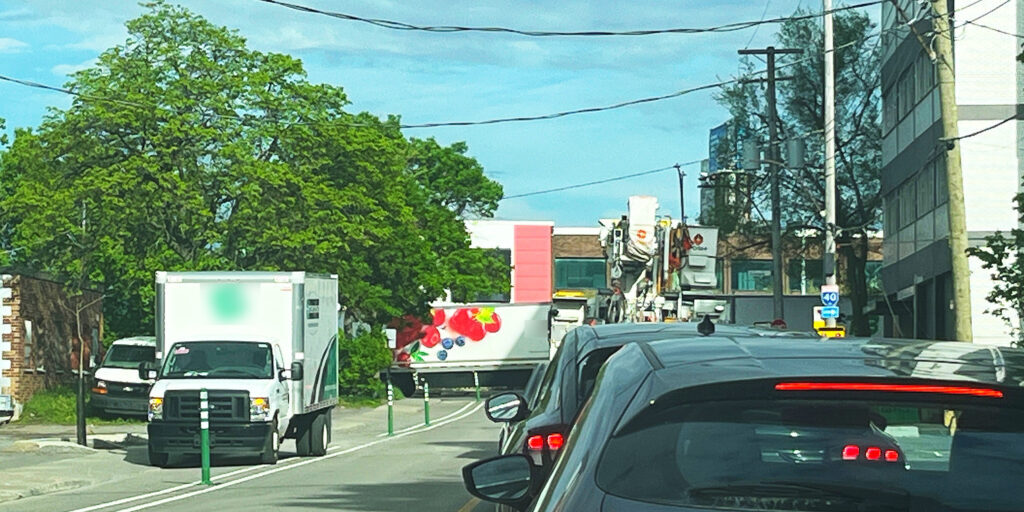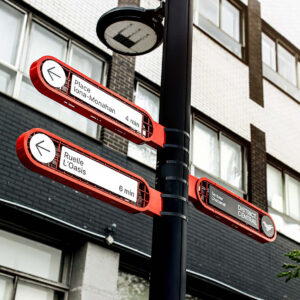August 25, 2025
A Harmonious Coexistence for the Future of District Central: Rethinking Urban Logistics Together

At the heart of Montréal, District Central stands out as a unique neighborhood: home to 2,100 businesses, it’s the city’s fourth-largest employment hub, with 25,000 workers—designers, manufacturers, truck drivers, cyclists, and residents all sharing the space. The local economy is thriving. But with this energy comes a challenge: how can we ensure the harmonious coexistence of all users while maintaining accessibility and economic vitality?
In November 2024, the first segment of the North-South bike path was hastily implemented in an industrial and commercial area. This marked the initial phase of a larger route planned for spring 2025. While the initiative aligns with the goals of ecological transition and aims to improve access to the neighborhood, it also brought underlying tensions to the surface. To better understand these issues, the SDC District Central, in collaboration with MOBA Mobilité Alternative, conducted a consultation with the businesses affected.

Beyond the numbers, a story of coexistence
Over a three-week period, 37 businesses located along the bike path route in District Central—representing nearly 6,400 employees—took the time to share their day-to-day realities. This collective portrait sheds light on the tangible tensions experienced on the ground, particularly around accessibility, urban logistics, and working conditions.
A large majority of respondents—86%—indicate that the bike path directly hinders access to their business. This disruption to mobility is not without consequences: 48% of surveyed companies anticipate revenue losses of up to $250,000 per year. On an operational level, 81% receive deliveries frequently—ranging from several times a week to daily—making smooth access to public space essential. Moreover, 68% report a lack of loading zones and rely on street-level delivery areas to fill the gap.
These figures are far from abstract—they tell the story of a neighborhood in transformation, where coexistence must be at the heart of urban planning decisions. They highlight the urgent need for collaborative solutions that balance economic imperatives, the operational realities of businesses, and sustainable mobility goals. “The industrial merchant model, rooted in short supply chains and local proximity, requires logistics that are not only efficient but also respectful of the human environment,” reminds Hélène Veilleux, Executive Director of the SDC District Central.
During a visit on-site in April 2025, the observations were striking: heavy trucks struggling to maneuver through narrow streets, overloaded delivery zones, and reduced visibility due to ongoing construction. A few cyclists began using the new bike path segment as soon as it opened, highlighting a very real need for safe travel options—one that the SDC District Central has been working to address through committee efforts for several years.
“With a logistical reality as complex as the territory itself, the key is to strike a balance between a productive district that must continue to deliver, create, and manufacture, and a neighborhood that also wants to welcome more active mobility. Too often, the debate becomes polarized around false oppositions: cyclists versus truck drivers, pedestrians versus motorists, local prosperity versus sustainability,” emphasizes Élisabeth Tremblay, Director of MOBA Mobilité Alternative, a long-time partner.

Building solutions together
The consultation and proposed solutions confirmed findings already identified in a previous brief by the SDC District Central. Several concrete ideas have emerged:
- Revising certain segments of the bike path to better align with logistical realities;
- Creating shared parking areas and designated loading zones;
- Limiting the bike path to one side of the street in specific sections to preserve parking spaces;
- Developing secure, dedicated delivery areas.
More than half of businesses want a comprehensive economic impact study to be carried out, demonstrating a desire for informed, fact-based decisions. "The SDC District Central has a unique ability to mobilise its community. By leveraging this collective strength, we can build solutions that respect all users. Ideally, every active mobility project should be a success story—one that not only facilitates movement but also contributes to the district’s growth. By working hand in hand, we can ensure that the initiatives put in place generate positive and lasting benefits for the entire community,” adds Élisabeth Tremblay.
District Central is not a neighbourhood in transition: it is a neighbourhood in action. It already has all the ingredients of a true urban laboratory: a dense economic fabric, an engaged community, and a clear vision. This dynamic has been officially recognised by the City of Montreal, which has designated the area as a Metropolitan Innovation Zone (ZIM) Hodge–Lebeau / District Central. This status confirms the area's potential to become a hub for experimentation in sustainable development, mobility and urban logistics.
Since its creation, the SDC District Central has acted as a catalyst: it unites, brings together and represents its members' interests to public authorities. Together, we have a unique opportunity to demonstrate what a true innovation zone can achieve: reconciling economic vitality, quality of life and ecological transition. The success of this coexistence depends on a clear commitment: bringing together businesses, experts, citizens and elected officials to build appropriate and realistic solutions. As Hélène Veilleux sums it up: “Coexisting means innovating. And innovating means accepting to do things differently, with those who know the terrain.”
A District Dedicated to Quebec’s Economic Self-Reliance
District Central is 25 million square feet. Photo credit: Branden Desormeau Pandemic, inflation, trade wars with the United States… every time a crisis breeds economic uncertainty, the importance of local…
Read MoreThe Challenges and Requirements of an Ambitious Transformation Process
In recent years, District Central has successfully attracted a wide range of businesses. Its many strengths even earned it the designation of “Metropolitan Innovation Zone” in 2021. Driven by the…
Read MorePublic and Private in Symbiosis: A Partnership with Vision
Buildings that characterise Chabanel West in District Central ©Branden Desormeau District Central is a thriving business district in the heart of the Ahuntsic-Cartierville borough. As a Société de développement commercial…
Read More


